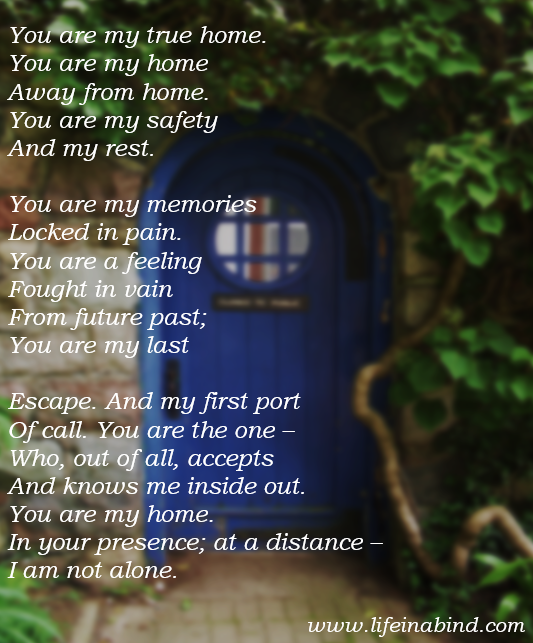I’ve been pondering the fact that spring, and the period around Easter, seems to have been very significant for me during the time I have been in therapy. It could be purely coincidental; it could be connected to the change in seasons; or it could be related to the cycle of therapy, rather than the cycle of the weather. Whatever the reason, for the last few years this time of year has brought crisis, followed by transformation. Admittedly, my therapy is not unusual in being comprised of multiple cycles of rupture and repair, many of them very intense and distressing. However, there is something about the events that have taken place around this time of year, over the past few years, that marks them out not just as successful episodes of repair, but as watershed moments, or ‘therapeutic paradigm shifts’, as I called them in this week’s Memory Monday post, “Progress in therapy – being ‘all in’ “, which can be found here:
https://lifeinabind.com/2016/05/01/progress-in-therapy-being-all-in/
Last year’s ‘paradigm shift’ started over the Easter therapy break, and is described in the post above. Despite the very positive changes that happened during April and May 2016, there was an enormous and hugely significant rupture at the very end of May and start of June. In the light of the progress that had been made, the rupture was sufficient to lead my therapist to question whether she was really helping me – a rather traumatic but ultimately vital and beneficial period for me personally, and for our work together (described in my post ‘BPD as addiction‘). Since last June, my therapy has had a somewhat different character, I think; the slowly developing more adult part of me has been present in session more often, and the level of trust and vulnerability I am able to display with my therapist, has deepened. I have a greater awareness of my behaviour both in and out of session, and of what motivates it. And though that doesn’t prevent other aspects of me (such as the inner child or teenager) from ‘acting out’, my awareness prevents the whole of me from being swallowed up in these episodes (as I would have been before), and ensures that part of me at least, remains connected to my therapist, rather than being resistant towards her.
Transformative thought the events of last springtime were, therapy is much like a spiral, where topics and feelings are revisited again and again but in slightly different ways, in different contexts, and in different depths. When I wrote about ‘being all in’ last year, I didn’t really imagine that there would be an even deeper version of that. But there is – and I know now that I’ve still got some way to go. I was as ‘all in’ as I could have been at the time; but as you make progress, and as you change, what you are capable of changes too – and in that sense, the therapeutic process demands more of you (though not in a prescriptive way!). It’s a little like the seated poses that one holds for minutes at a time during Yin yoga – as you try and release the tension in your body and focus on your breathing, you find you have more to give. If your body is in a forward fold, you find that you can fold more deeply; if you are stretching, you find that you can stretch more strongly. Your body develops possibilities that seemingly were not present before.
Between January and March 2017 I felt overwhelmed and stuck; unsure and directionless. I wrote very little down about my sessions, and my memory of them was incredibly patchy. I tried to describe to my therapist how I felt, in my post ‘To my therapist – the roads half taken’. Though my therapist encouraged me to sit with these feelings, and to wait, it was frustrating and difficult to do so. She reassured me that this was simply another phase in our work, and that such periods often follow or precede times of great growth; but I simply felt lost. The Easter therapy break this year was far less positive and far more of a struggle than the one last year, and I was afraid that the next few months might be as difficult as the ones that came before.
But, once again, my therapist was right. Sometimes you’re not aware of how much things have shifted, internally,until you come to another ‘crisis’. I might have felt stuck for much of the last few months, but somehow, while I was waiting for those feelings to pass and the ‘stuck-ness’ to resolve, part of me was becoming ever more invested in the work and the relationship, and preparing for the next steps that I needed to take. The start of last week was incredibly tough – those who follow me on Twitter might have seen me tweet “Right now I feel like I never ever want to see my therapist ever again”. But that is a million miles away from how I feel now, and the process of working through that situation feels like another watershed moment in my therapy. A moment that not only showed me how much things have changed in the last couple of years, but also gave me a renewed determination to be ‘all in’ – in even deeper and more diverse ways than I have managed so far.

